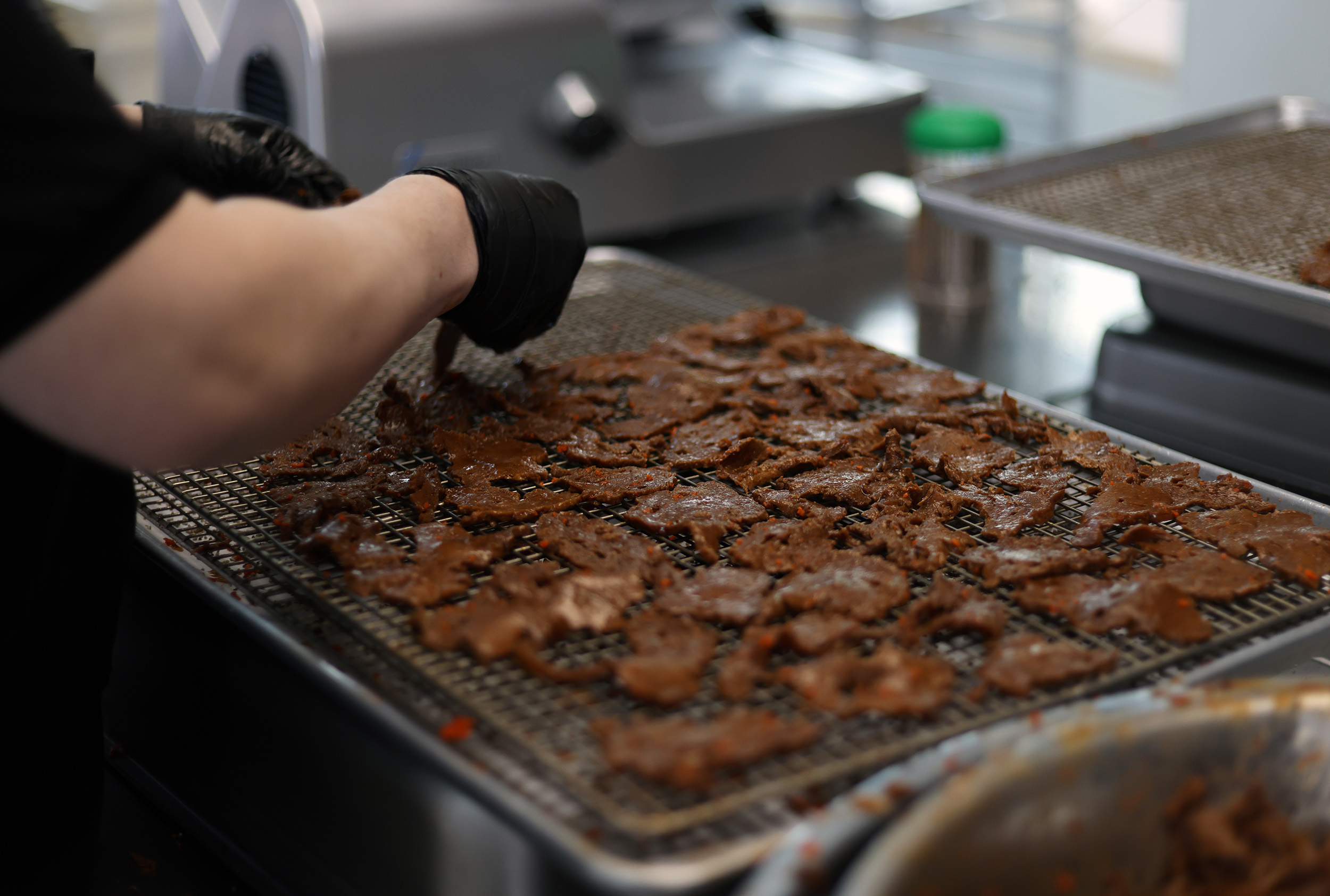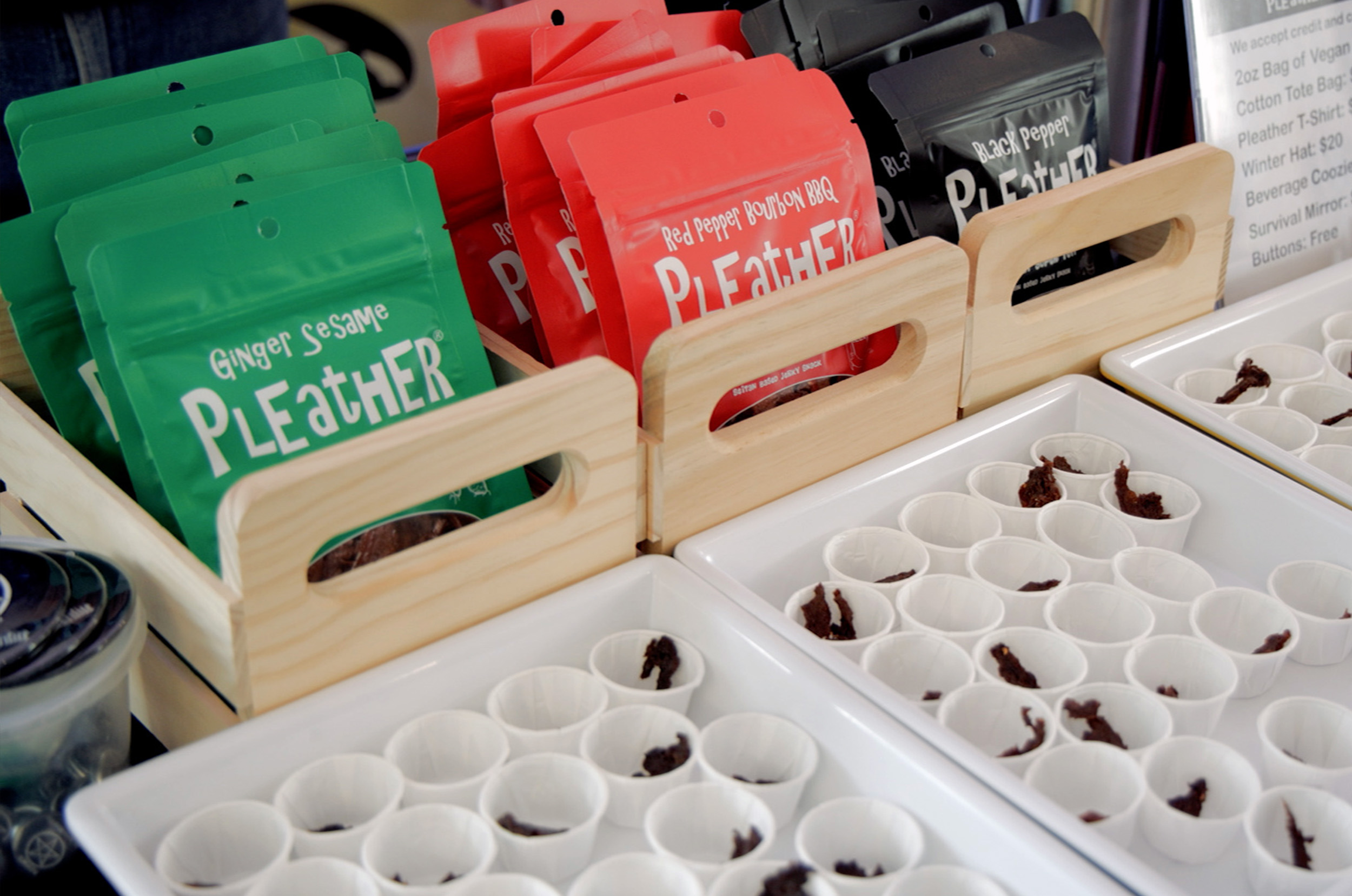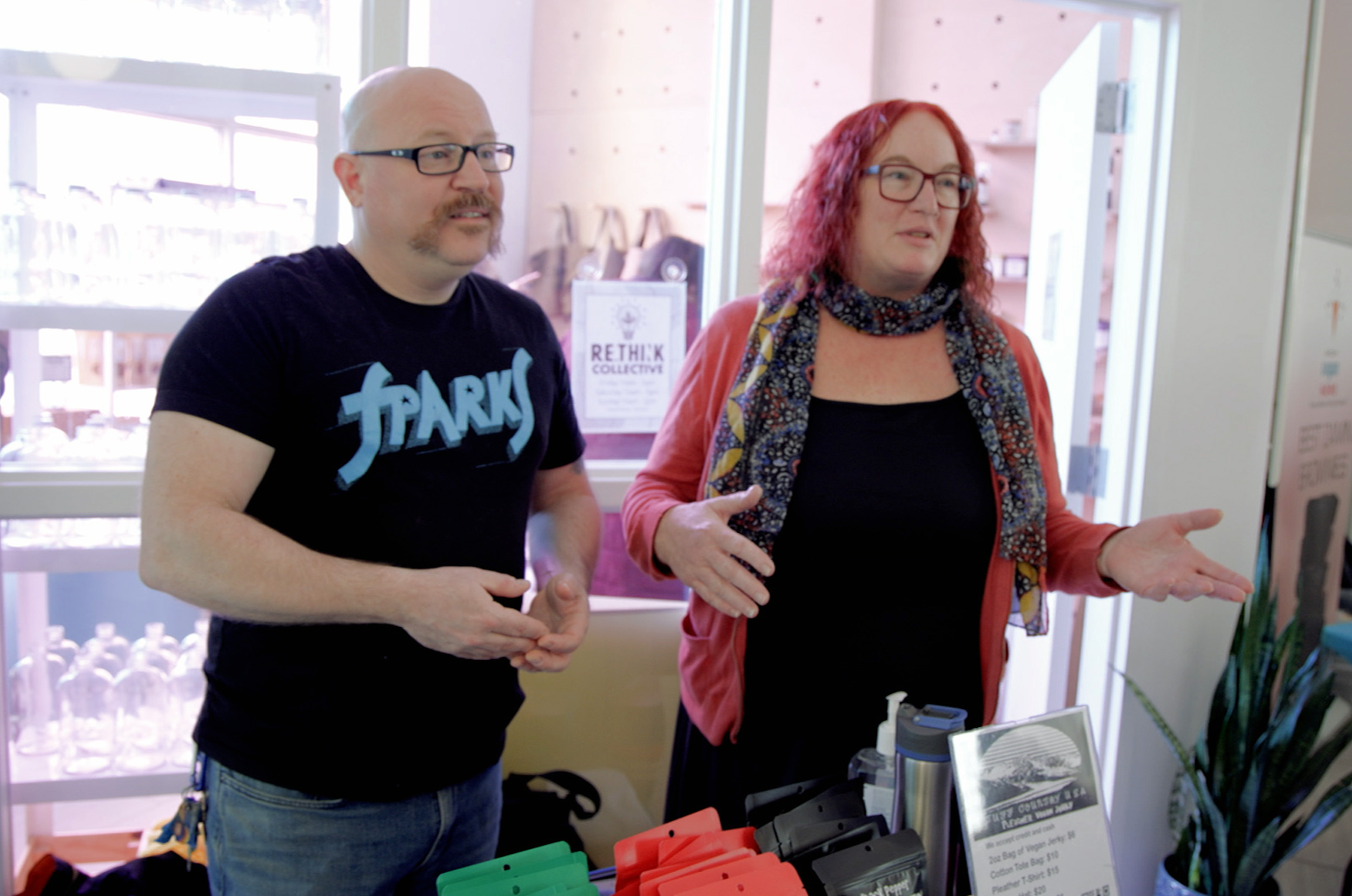Melissa and Matt Trahan were ready to bring their vegan jerky to market. Now, all they needed was a name.
It looked like meat and even tasted like it to many people. The Lakewood couple said that after only a few chews, some vegans and vegetarians would become alarmed. Would another gnaw lead them down the slippery slope to their carnivorous pasts?
Matt wanted a name that was edgy. They both decided that Vegan Imitation of Human Meat was perhaps a little too edgy. About two weeks into brainstorming a name, Melissa blurted out “Pleather” during a walk.
Matt “was like, ‘That’s brilliant. Let’s go to the bar and have a drink on that!’”
The Trahans started Pleather in 2015. It began as a Side Hustle for both. About five years later, Melissa left her job doing consumer advocacy at a nonprofit to work in the business full time. Matt still works as a full-time data curator at a nonprofit while helping run the business on the side.
The word pleather is often used as a derogatory description of imitation leather: fake and cheap-looking. Buttery, soft pleather just isn’t a thing.
But for Matt, Pleather is an indirect homage to the very leathery beef jerky he adored until becoming vegan about 10 years ago. Though he gave up meat, he didn’t want to go without the taste, struggle and satisfaction that eating a really chewy piece of beef, turkey or salmon jerky brought him. “Welcome to Tuff Country” hovers above three Pleather packages on the business’ homepage. The 2-once packages sell for $5.99.
Melissa, who hasn’t eaten meat in three decades, said associating the word pleather with clothing or accessories is passe.
“Now it’s vegan leather,” she said.

Whim spurs business
Melissa had made seitan from scratch for years. Often used as a meat substitute, the high-protein food is made from cooked wheat gluten. She was making some one day when Matt asked her on a whim, “Can I take a few slices of this and mess with it?”
Though he thought it far-fetched, he would try to turn the usually soft seitan into something tougher. Matt’s main motivation for becoming vegan was to address his then recently diagnosed high blood pressure and high cholesterol. He generally wasn’t having difficulty giving up meat, fish and poultry. However, he was still craving jerky.
This is amazing. You need to start selling this.
Jamie Bradley, the Trahans’ friend and Pleather employee, who urged them to go into business
He rolled the seitan into thin pieces, covered them with a “simple marinade,” then baked them.
“When it came out, I was expecting crackers, basically,” Matt said.
What emerged from the oven didn’t quite have the chewiness of jerky, but it was in the ballpark. He let the vegan jerky in the making set out for a few days. It had gotten closer to resembling the real thing. After a few months of tinkering with the recipe, he arrived at the first version of what would be Pleather. The next test was to see that the jerky wouldn’t go bad after a few months.
“We just kept a bag of it in the car, would eat it and be like, ‘Let’s see if we get sick,’” he said.
When the couple didn’t, they started sharing what would become Pleather with friends. Jamie Bradley was among them.
“This is amazing,” she remembers saying to them. “You need to start selling this.”
The Trahans kept hearing this so much that they knew it was time to turn making vegan jerky into a Side Hustle. But they knew it wouldn’t be a home-based business.
“Too much fur floating around,” Matt said of their six cats. “They’re constantly under foot.”

You can’t call it jerky
The Trahans first worked out of a shared commercial kitchen in Lakewood before making the Cleveland Twist Drill building on Lakeside Avenue Pleather’s headquarters. Creating a product and even coming up with a name were the fun parts of starting a business. Meeting a multitude of food manufacturing and other quality standards was not.
“The regulatory part was mystifying to me at first,” he said.
Things like labeling, which had requirements “right down to the size of the fonts.” The couple had to work with a laboratory to standardize a process for keeping the vegan jerky shelf-stable. Proving that he and Melissa didn’t get sick after eating jerky left in the car for a few weeks wasn’t enough. They had to learn about monitoring the water activity in batches of the jerky to ensure that it was not creating an environment for bacteria, like Salmonella, to grow.
The Trahans were even required to work with a laboratory in developing each of the three Pleather flavors: Black Pepper, which the website describes as “intense umami [similar to savory] with an aromatic black and white pepper attack. Red Pepper Bourbon BBQ, “a complex spice explosion doused in real Kentucky Bourbon.” Ginger Sesame, “savory with a strong ginger kick and a pleasing hint of black sesame oil.”
“I was an English major and Melissa was an anthropology major,” he said. “It’s all been a learning curve.”
The couple have taken in stride meeting most regulations. However, there was one that temporarily unnerved them. A state inspector looked at the Pleather label, saw “vegan jerky,” and said, “You can’t call it jerky” because the product doesn’t contain animal protein.
Another inspector later checked with higher ups, who said “vegan jerky” didn’t violate regulations. Still, the fear of having to abandon the phrase hovers for the Trahans, even if at a distance. They chose not to include the word jerky in the name of the website, which is pleathervegansnacks.com.
“People often ask, ‘What other vegan snacks do you have?’” Melissa said.
For now, it’s solely jerky.

Leap just before pandemic
Sales were growing so much that Pleather was transforming from a Side Hustle into a full-time business. One of the first signs of this was outgrowing the shared commercial kitchen, which couldn’t accommodate the couple’s need to use it more to fill increasing orders. Not having access to a kitchen when they needed one would impede the growth of the business.
In 2020, they moved into the Cleveland Twist Drill building, and Melissa began working at Pleather full time.
“It was scary, especially at the jumping-off point,” she said.
Like many businesses during the pandemic, Pleather has faced supply shortages and higher prices. However, Matt said being a small business has given them options. If one supplier can’t fill what is a large order for Pleather, the Trahans can spread it among several suppliers.
The early days of the pandemic also meant that clubs and bars, a crucial market for Pleather, were closed. When they reopened, business was often slow. Selling to this market was a natural for the Trahans, who are members of the punk rock band Kill The Hippies. They frequently sold Pleather at their gigs, developing both a food and music following. Devoting more time to Pleather means club dates are less frequent, the couple said.
Perhaps club sales during the pandemic weren’t lost but shifted elsewhere.
“Our Amazon orders just started taking off,” he said.
When entertainment spots reopened, demand for Pleather was still there. No Class, a bar and live music venue in Cleveland, was among them.
“I think us employees eat it as much as the customers,” said Roger Wright Jr., a bartender and manager. “It tastes really good. I really like the Red Pepper Bourbon BBQ.”

Looking forward
Melissa and Matt are at Pleather, standing around a workstation composed of a series of stainless steel tables. On top of them are huge stainless steel bowls and large stainless steel trays with racks.
The Trahans are preparing batches of vegan jerky. They take what could easily be mistaken for beef from the bowls and then lay it out on trays. They then shake generous amounts of seasoning on the jerky. In this case it is the Black Pepper flavoring.
The trays will then be placed into ovens to dry. Don’t ask for how long– it’s a secret. Don’t even think about asking how the homemade seitan is made or what the steps are for turning it into vegan jerky. That’s a really big secret.
Joining them in making the batches is Bradley, the friend who early on persuaded the couple to go into business. She works part time at the business and is a Pleather fan. Snacking on the Black Pepper flavor with a glass of ginger ale remains a favorite for her.
For the couple, this is their happy space. They engage in good conversation while they prepare the batches. Often music fills the production space. It’s frequently 1970s glam rock, like that made by David Bowie.
The only thing missing for Melissa is that the sun is not out on this snowy March day. She was drawn to this former industrial building because the large windows near the work area often bathe the space in sunlight.
The lack of sun doesn’t pose much of a damper for Matt. He enjoys helping make the jerky, but he often doesn’t get to do so. Because he works a day job, Matt focuses on administrative things that can be done after hours. As he makes the jerky, he contemplates Pleather’s future. Melissa wishes that he could work full time in the business, but Matt said it’s too soon to leave his day job. Sales must increase. He said Pleather needs more vendors. The couple also must master online selling. He said the pandemic showed them it could be a growth area.
Until then, Matt will keep his Side Hustle. Still, he considers himself lucky because he was able to create a product and find a market for it.
“It’s a great Side Hustle because I know it is going to turn into something much larger,” he said.


